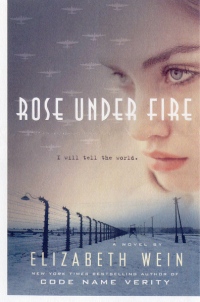| ________________
CM . . .
. Volume XX Number 4. . . .September 27, 2013
excerpt:
In the excerpt above, 18-year-old Rose Justice has just arrived at Ravensbruck, a Nazi concentration camp for women. American by birth, Rose was working for Britain’s Air Transport Auxiliary when she was captured en route back from a flight into Europe. She spends the next six months at Ravensbruck and becomes part of a group of women which includes the “Rabbits”, Polish prisoners who were used in German medical experiments. Readers may be familiar with Wein’s award-winning book Code Name Verity, also set during the Second World War. This new, companion novel includes a few of the same characters, but easily stands alone. Wein attended a summer conference held on the grounds of Ravensbruck and takes her readers into the very heart of the camp. While Rose, herself, is fictional, Wein points out in her “Afterword” that the camp certainly did exist and that all of the essentials of the story actually happened; she has merely filled in a few of the small details in order to complete the story. Rose moves from an innocent young woman, keen on the adventure of being in Britain and flying with the ATA, to a much more mature and thoughtful person who must deal first-hand with hardship, privation and cruelty. While still at home in the US, Rose had only a vague idea of events in Europe; she was busy with studying at school, playing basketball, enjoying family times at the lake and helping around the house. Only when Rose reaches England does she realize that her counterparts at the ATA have been dealing with air raids, food shortages, interrupted sleep and very little social life. And then she is captured; once she has been in Ravensbruck for a few days, even life back in England seems like an unattainable dream. Like many war novels, Rose Under Fire is a story of survival. Not only must Rose find every bit of strength she possesses just to endure, but she must also learn to depend on others for help. The importance of helping one another keeps the women strong and turns them into survivors instead of victims. Part of the survival is the constant theme of “tell the world”. The characters feel that, if the proof of their imprisonment and torture gets to the media and thus the rest of the world, those who did not survive will be vindicated. Wein ends the story with the Nuremburg trials in 1946 when the world does, in fact, learn about the atrocities of the concentration camps and the persecutors are finally punished. Wein gives her readers larger than life main characters who remain believable in the context of the plot, including a woman writer whose husband was Jewish, one of the many Polish “Rabbits”, a woman who is a Soviet pilot, and guards whose human qualities are evident, despite the role they must play in the camp system. They all become individuals with distinct personalities rather than the stereotypes one might expect. Not only would the novel lead to discussions about World War II, it also raises moral dilemmas as well. Do we always have a choice about what we do, or can we sometimes be forced into situations and roles which we would rather not accept? Wein has done extensive research, both with her personal trip to Ravensbruck and through the many print and electronic sources cited at the end of the novel, and so readers feel the punishments, smell the smells and can virtually taste the ‘non-coffee’ described by Rose. Wein lists Survivor Accounts among her research as well, and this has undoubtedly helped her put a human face on the many characters of the novel. Even months after the celebration of the end of the war, there are many, many scars, both literally and figuratively, left on the survivors. Yes, they want to “tell the world”, but it is only in trying to describe their ordeal that they realize how deeply they have been scarred and how unlikely it is that those who have not experienced a Ravensbruck can ever truly understand its shattering effects. This novel is historically accurate, and the details in it are appalling. The inhumanity described seems unbelievable, and yet we know it not only happened then, but it continues to happen in worn-torn countries now as well. The story is emotionally engaging and exhausting and provides themes for discussion in many areas: history, philosophy, religion. One of Rose’s means of helping herself and her friends cope is to recite and/or make up poetry, and these poems are another facet of the book to be explored. Sympathetic characters, scenes which could come from a horror movie, edge-of-your-seat plot action: this novel has them all. While the title suggests a book for female readers, I am sure the setting and action of the novel would have equal appeal for males. Although told from the perspective and journal writings of a teenager, this carefully researched and well-written novel would also appeal to adult readers who wish to learn more about World War Two from a new vantage point. In other words, this is a stand-out book which will appeal to all and deserves a place on every library or personal bookshelf. Highly Recommended. Ann Ketcheson, a retired teacher-librarian and high school teacher of English and French, lives in Ottawa, ON.
To comment
on this title or this review, send mail to cm@umanitoba.ca.
Copyright © the Manitoba Library Association. Reproduction for personal
use is permitted only if this copyright notice is maintained. Any
other reproduction is prohibited without permission.
NEXT REVIEW | TABLE OF CONTENTS FOR THIS ISSUE
- September 27 2013.
AUTHORS |
TITLES |
MEDIA REVIEWS |
PROFILES |
BACK ISSUES |
SEARCH |
CMARCHIVE |
HOME |
